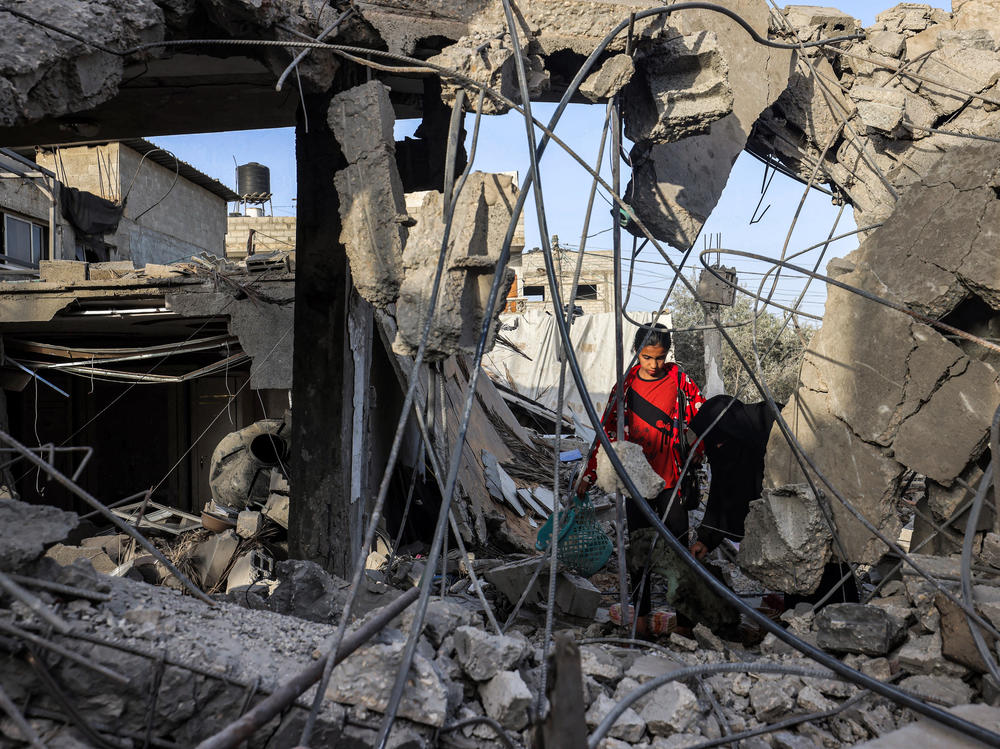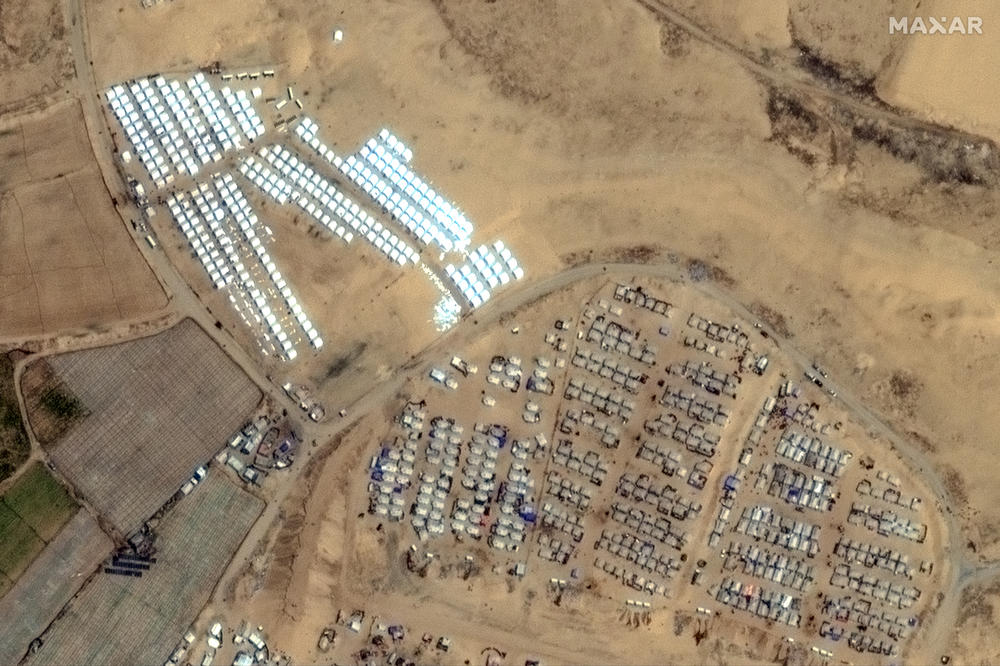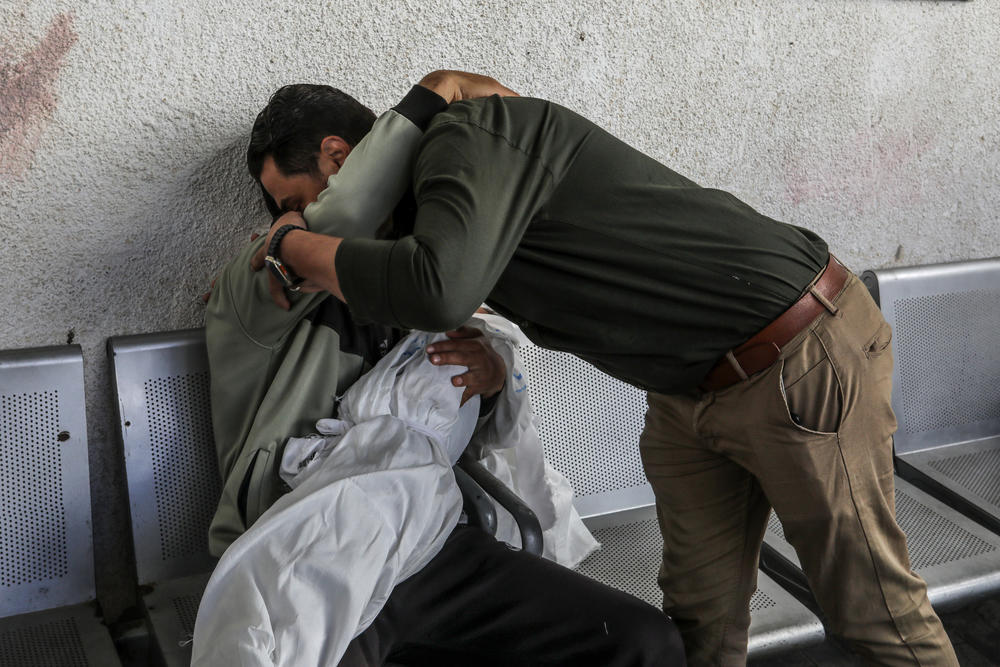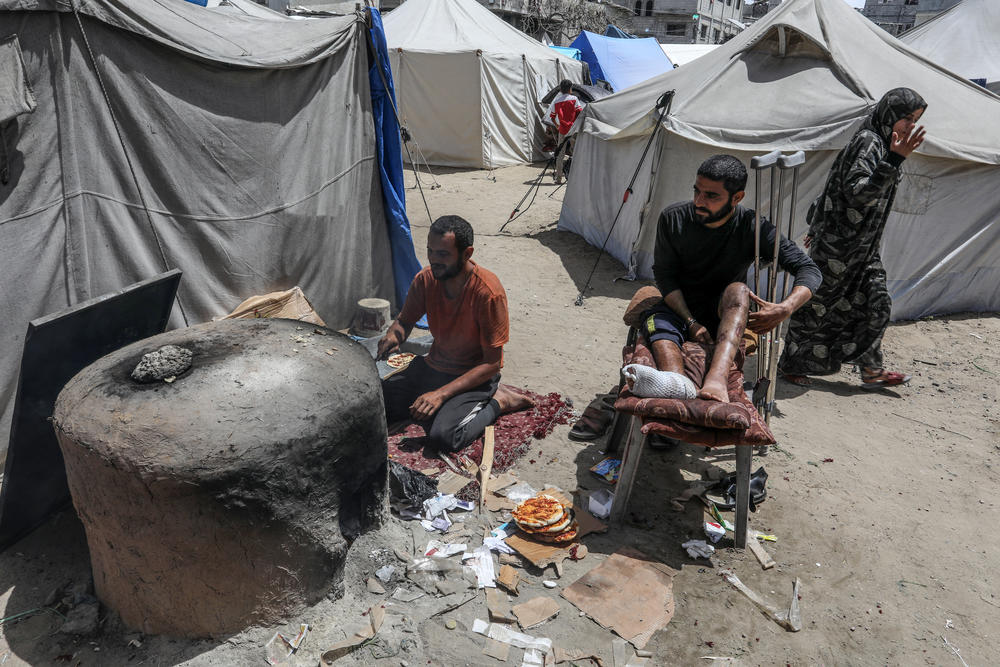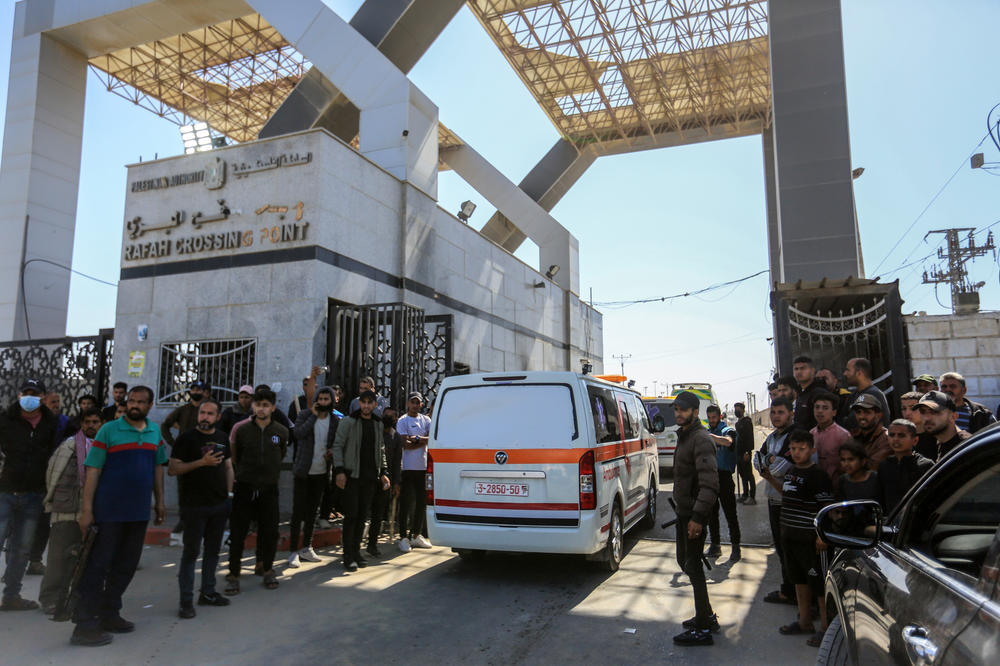Section Branding
Header Content
What to know about a possible Israeli military offensive in Rafah
Primary Content
RAFAH, Gaza Strip — Some of the more than 1 million displaced Palestinians in Gaza's southern city of Rafah are weighing the risks of whether to stay or flee as concerns grow of a military offensive there that Israel says is necessary for its war aims.
Israeli Prime Minister Benjamin Netanyahu approved the military's plan for an attack on Rafah last month, but there's still no publicly announced time frame for an assault.
Several recent developments, though, indicate the military may be laying the groundwork for its plans. This week, the military announced it had called up two reserve brigades for duty in Gaza. Satellite images examined by NPR show several new tent encampments, which can hold thousands of people, have been erected this month in areas north of Rafah. There have also been almost daily airstrikes on the city in recent weeks, indicating increased pressure by the military on Rafah.
Israel says an offensive is necessary to eliminate Hamas and free the remaining 133 hostages taken captive in the Oct. 7 attack, most of whom are believed to be alive. Israel earlier this year freed two hostages from Rafah in an operation that killed scores of Palestinians.
Abdullah Omar is one of the many displaced people sheltering in Rafah. The accountant, who fled Gaza City with his family months ago, said the thought of an invasion makes him feel paralyzed before his children.
Like many people in Rafah, he's sheltering in a crowded apartment with other families. There are babies, elderly and ill people among them, he said. The idea of relocating to a tent is painful, he said, because his wife is still breastfeeding their youngest child and needs privacy. The prospect of an offensive is "one of the most terrifying things for us," he said.
Threats of an invasion have been a tool that Israel has used in negotiations with Hamas for a temporary cease-fire to release hostages, but those talks — mediated by Qatar and Egypt — have stalled, in large part over the duration of a cease-fire, as Israel insists it must take Rafah and dismantle Hamas battalions it says operate there.
But with those talks at an impasse now for weeks, there's growing worry in Rafah of an impending assault. There's a "deep anxiety prevailing in the south about the possible, looming, upcoming military offensive, which seems to be back on the table," Philippe Lazzarini, the head of the U.N. relief agency for Palestinians, said this week.
Loading...
What we know about Israel's plans
A senior Egyptian official told NPR that Israeli intelligence officials have indicated five areas in Rafah where they say tunnels and militant hideouts are present. The official spoke on condition of anonymity to discuss the sensitive nature of the discussions. The official disputed Israeli claims of tunnels in some of those areas.
"Hamas should know that when the IDF [Israel Defense Forces] goes into Rafah, it would do best to raise its hands in surrender. Rafah will not be the Rafah of today," Israeli Brig. Gen. Itzik Cohen told Israeli public broadcaster Kan on Tuesday, adding that the city would be free of arms and hostages.
For weeks, senior Israeli officials and members of the Biden administration have been in talks about Israel's plans for an offensive in Rafah. Egyptians officials tell NPR that some of those plans have also been shared with Egypt.
Multiple officials with knowledge of the discussions have expressed worry about the possibility of a high death toll among Palestinian civilians as Israel targets areas with suspected tunnels.
The U.S. has pressed Israel to pursue "alternate ways" of addressing a Hamas military presence in Rafah, said Ambassador David Satterfield, the U.S. special envoy for Middle East humanitarian issues.
"We think there are other ways to deal with this. And if there is not a credible, executable humanitarian plan, then we cannot support a ground operation," Satterfield told reporters Tuesday.
For its part, Egypt issued a statement this week denying "any dealings with Israel" regarding Rafah, and it reiterated its strong opposition to an offensive in Gaza along Egypt's border, saying it "will lead to massacres, massive human losses, and widespread destruction."
Tents are being built that can hold thousands of people
NPR has identified at least four large tent encampments erected north of Rafah over the past month. Commercial satellite imagery shows two were erected near Khan Younis over the past week.
A mass evacuation of Palestinians from Rafah could take weeks, and there's no confirmation these tents are being set up for that purpose. The Israeli military declined to comment when asked by NPR about the new tents as seen on satellite imagery.
Israel's Ministry of Defense said this month that it planned to purchase 40,000 tents to house Palestinians displaced from Rafah. With a capacity of up to 12 people in each, the tents could, in theory, house up to 480,000 Palestinians — about a third of the number of people thought to be sheltering in Rafah.
The U.S. says it wants to see a humanitarian plan for Rafah that includes shelters and access to health care and aid for civilians.
"There are currently somewhere around 1.4 million people in Rafah — many of them displaced from other parts of Gaza. It's imperative that people are able to get out of the way of any conflict, and doing so is a monumental task for which we have yet to see a plan," U.S. Secretary of State Antony Blinken said last week.
He said it's not enough to just move people out of harm's way. He said it's imperative that "they can be supported with humanitarian assistance."
An official with the Egyptian Red Crescent told NPR that the aid organization is involved in building new tents in Gaza, though he would not comment on the specific location of these efforts, citing security concerns. The official spoke anonymously to discuss the ongoing work. A spokesperson at the Egyptian Red Crescent declined to comment.
Egypt is concerned that an Israeli assault on Rafah could forcibly displace Palestinians into Egypt's Sinai Peninsula. Egyptian President Abdel Fattah el-Sisi has said this could drag Egypt into the war and facilitate a mass exodus of Gazans who may never be allowed to return.
Aid groups say a Rafah operation would be "catastrophic"
Humanitarian groups and U.N. agencies have based their operations out of Rafah for much of the war. It's the only exit point for wounded Palestinians seeking treatment abroad and the few who can afford expensive visas to leave. It's also how aid workers and much of Gaza's humanitarian aid enters.
A military offensive in Rafah would be "catastrophic," says Samah Hadid, a spokesperson for the Norwegian Refugee Council, which provides food, water and other humanitarian supplies to displaced Palestinians. "Any offensive would just cause the aid response to come to a complete collapse," she says.
Like most major aid groups, the Norwegian Refugee Council does not currently have set plans to evacuate, says Hadid. In the event that an offensive does begin, she says, "we would hope to stay and to deliver support to the displaced population as much as possible and as safely as possible."
Several humanitarian organizations had already suspended operations in Gaza this month after an Israeli airstrike on a World Central Kitchen aid convoy killed seven of the organization's workers.
A majority of organizations working in Rafah have contingency plans for an evacuation. But those plans cannot be fully effective without more credible information from Israel, said Joseph Kelly, the director of the Association of International Development Agencies, an organization that coordinates with aid groups working in Gaza.
"To the best of their ability, they're stockpiling aid. They're looking at certain locations [north of Rafah] such as Al-Mawasi, Deir al-Balah and parts of Khan Younis where there's some level of structural integrity to serve people that would eventually be pushed there," he said.
COGAT, the Israeli agency responsible for Palestinian affairs, has said it will notify aid groups "in a reasonable amount of time," Kelly said, but the agency has not specified how soon that warning will come.
Palestinians say there's no safe place to go
In March, a targeted raid on Gaza City's Al-Shifa hospital killed 200 militants, according to Israel's military, which hailed the raid as a model. The fighting also decimated the hospital, and the Palestinian civil defense says hundreds of bodies, many of them civilians, are still being recovered in the city, which is sparsely populated these days compared with Rafah.
The United Nations says more than a million Palestinians are sheltering in Rafah, a fourfold increase from the city's prewar population and more than half of the Gaza Strip's total population. Many of the displaced individuals have crowded by the dozens into apartments or houses owned by extended family or friends. Others have lived for months in tents or other temporary structures.
Hadi Al-Sayyed, who was displaced from his home in Gaza City and now lives in an unused storefront with his family, says people are slowly dying in Rafah and being targeted in airstrikes there too.
"When they tell us to go to any place, we will go, but only if they provide us with a place to live and provide water and food — not just throw us in the desert and tell us 'survive,'" he says.
Already, though, Rafah is unsafe for civilians. Israeli airstrikes have ramped up over the past month. More than 230 people have been killed in airstrikes in Rafah since March 21, with three-quarters of the victims women and children, according to Yousef Ibrahim, who works with the Palestinian Centre for Human Rights and compiles data from hospitals about the strikes on his city.
Al-Sayyed says people's patience has run out. He says people might try to climb the border fence with Egypt or try to return to their homes in Gaza City, where Israeli tanks have cut off access, saying militants could try to regroup there.
He says people don't want foreign aid or assistance or even a cease-fire. "We want the war to end," he said.
